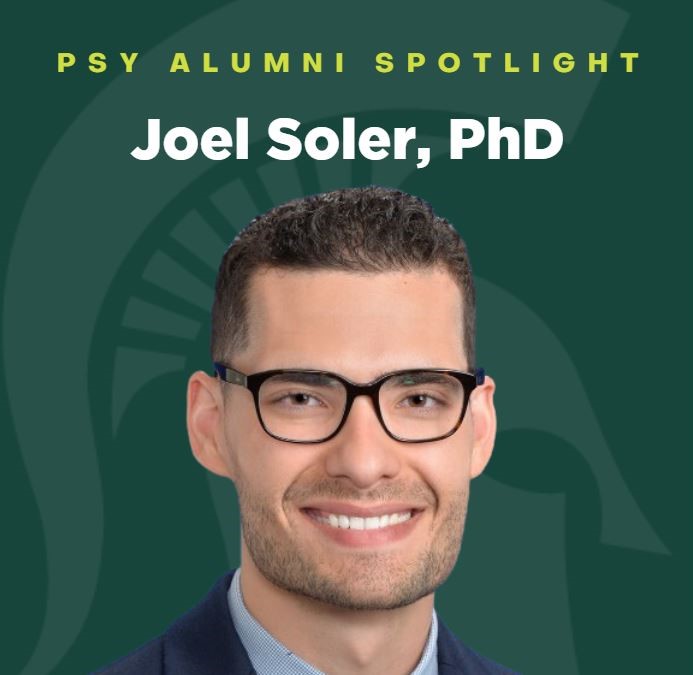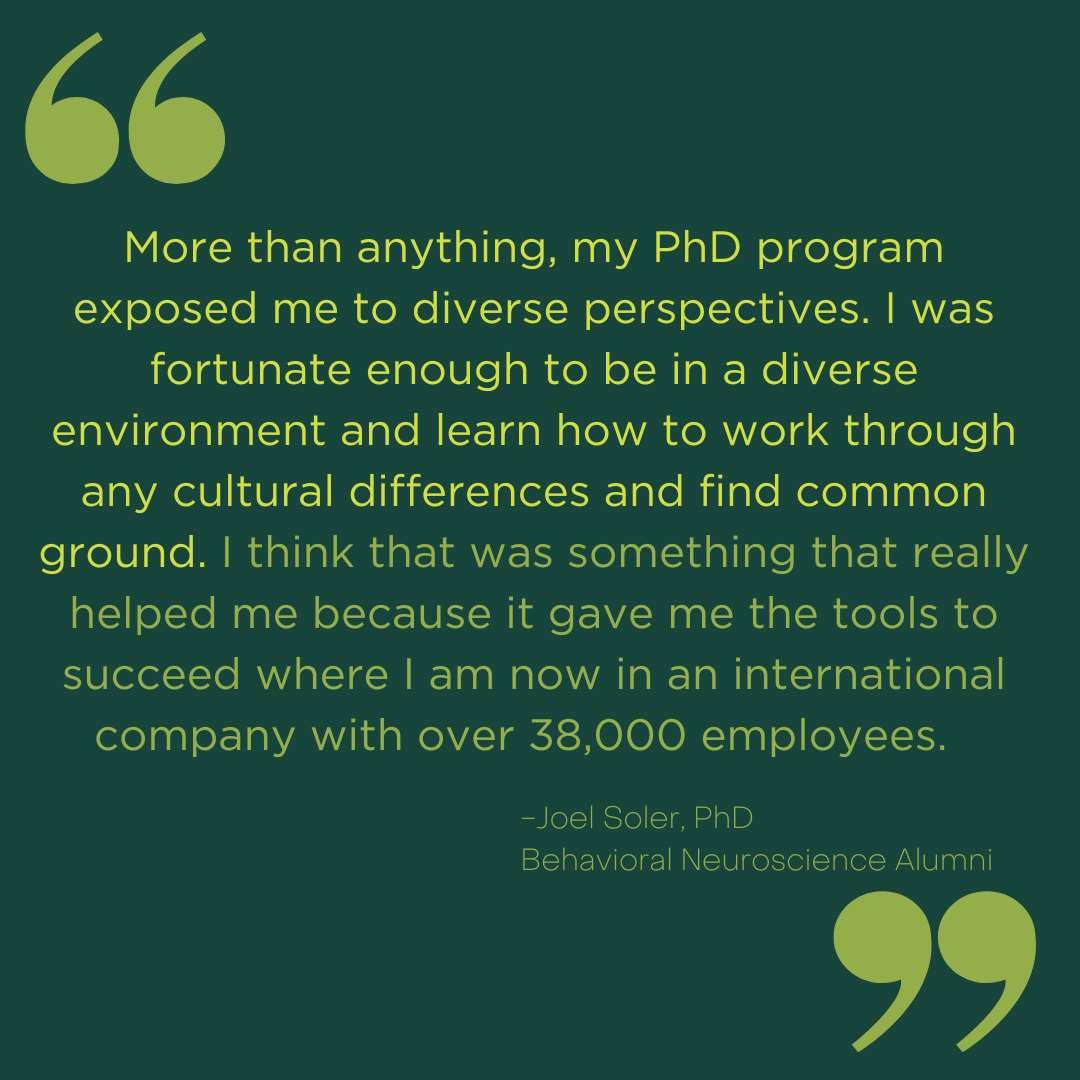Meet Behavioral Neuroscience Spartan Joel Soler, Ph.D.
September 12, 2023 - Shelly DeJong

What have you been up to since earning your PhD?
Upon getting my PhD in May of 2019 from MSU, I joined Eli Lilly in July of 2019 as a medical writer where I supported our late phase clinical portfolio. I’d help write submission packages to get a particular drug candidate that's in late phases from clinical studies to market approval. I worked on writing submission packages to several regulatory agencies, including the FDA and EMA among others.
In that role, I knew that I needed to make yet another career pivot when a promotion opened up internally and I didn't apply for it. I asked myself why I wasn’t motivated to apply for it, and I realized that I needed to find something where I enjoy the challenges and effecting change in whatever measure I can. I knew I wanted to stay at Eli Lilly, so I thought about what else I could do. I thought about all the stuff that I did in grad school. One thing that I did in my extracurricular activities was being involved in recruiting. I’d go to other Big 10 schools, and I always loved talking with those who were interested in grad school. I also went back to my alma mater University of Puerto Rico, and I recruited two students to a Research Experience for Undergraduates program. I realized that I’d love to do something like that in my career because paying it forward is important to me. As I progress through my career, I want to be holding the door open for others. When a position opened up in campus recruiting, I applied, and I was fortunate to get it. I now work to help recruit the next generation of talent for Lilly research laboratories.
How does your background in behavioral neuroscience inform your current work?
As a graduate student, I had an internship with the pharmaceutical company Zoetis in Kalamazoo, Michigan in their Biologics Regulatory Affairs division. This experience helped me see that I wanted to work in the pharmaceutical industry for the long term - I knew I wanted to be at the forefront in helping get medicine to the patients who most needed it. That was something that I found meaning in.
Neuroscience is my passion. I have always loved studying what the neural mechanisms are for which behavior occurs and producing those mechanisms. But when I was looking at entering the pharmaceutical industry, I pivoted in terms of my way of thinking of what I could do professionally. As graduate students, it's very easy to fall into the mindset of “If I'm not doing something that was directly related to my area of expertise at this time, then I have not been successful.” Instead, I decided to figure out what is the most transferable skill set that I have gained throughout my education. When you're in a PhD program, you're tasked with the end goal and what gets you that degree is producing new knowledge, something that no one has done before. You have to think critically about what the gaps are, what you need to do to get there, and how to design experiments. How to go from knowing nothing to building yourself up to competency to then push the field forward. With that in mind, I realized my biggest skill set from my PhD program wasn't learning how to do a specific technique, but it was learning how to think and how to question everything. That's what led me to my current career path.
How did your PhD program uniquely prepare you for your career path?
More than anything, my PhD program exposed me to diverse perspectives. I was fortunate enough to be in a diverse environment and learn how to work through any cultural differences and find common ground. I think that was something that really helped me because it gave me the tools to succeed where I am now in an international company with over 38,000 employees.
Also from a technical perspective, it gave me everything that I wanted and more. I came into grad school with limited experience technically. I was fortunate enough to have an advisor that let me pursue my own research interests and grow the way that I wanted to grow. She was very, very supportive but was hands off in a good way in terms of letting me develop in the way that I want to develop. Having someone who takes into consideration what you're interested in, definitely helped me become more independent as a scientist and thinker.
 What makes you proud to be an MSU psychologist?
What makes you proud to be an MSU psychologist?
More than anything, right. MSU has a great community. Having people engage with the community in different activities is something to be very proud of. When I was a student, I participated for several years at the Science Fest. One year, we built this huge contraption to illustrate to kids how neurons communicate with each other. We had kids carry a ball through an obstacle course to simulate electrical impulse from the cell body through the axon to the dendrites. Another year we made gelatin brains to teach transcranial stimulation as a method of treatment for Parkinson's disease. We put these sensors underneath the brains and then had kids touch the little sensors with electrodes. Then we'd be like, “Hey, you stimulated the area and helped cure this patient of their Parkinson's disease!” It was cool to see young children engaged and learning about neuroscience.
For a school like MSU to do this for the community is pretty special.
What do you hope that your impact will be?
Throughout the years, I think that's evolved a little bit. Before if you were to ask me when I was a grad student, I would have said to have a paper in a major journal. That is what would have translated to success for me. As time went on, I started realizing that using external factors is not the best way to lead a fulfilling life.
Right now, rather than being a renowned scientist or a recognized professional within the pharmaceutical industry, how I measure success is if I can help other people. Help them find their way and then also to be a conduit to their success. That's my success as well. That's what I get more pleasure out of. Even when I was a grad student, I found it really satisfying training and working with undergrads in our labs. Seeing them contribute and present their posters was something very satisfying to me. Not only was it a testament that we're doing good science, but also that I was able to help them develop their own scientific capabilities.
Do you have anything else that you'd like to add about the program or about your path or anything like that?
For anyone currently getting their PhD degree: You’ll go through obstacles a lot of times, and sometimes it feels like the finish line is nowhere in sight. And I would just say to remind yourself of why you started the journey in the first place. As humans, we preoccupy ourselves so much on getting to the destination that we sometimes take the journey for granted. When I look at my time as a graduate student, I see five hard years, but I see that I became a better person for those five years of struggling.

